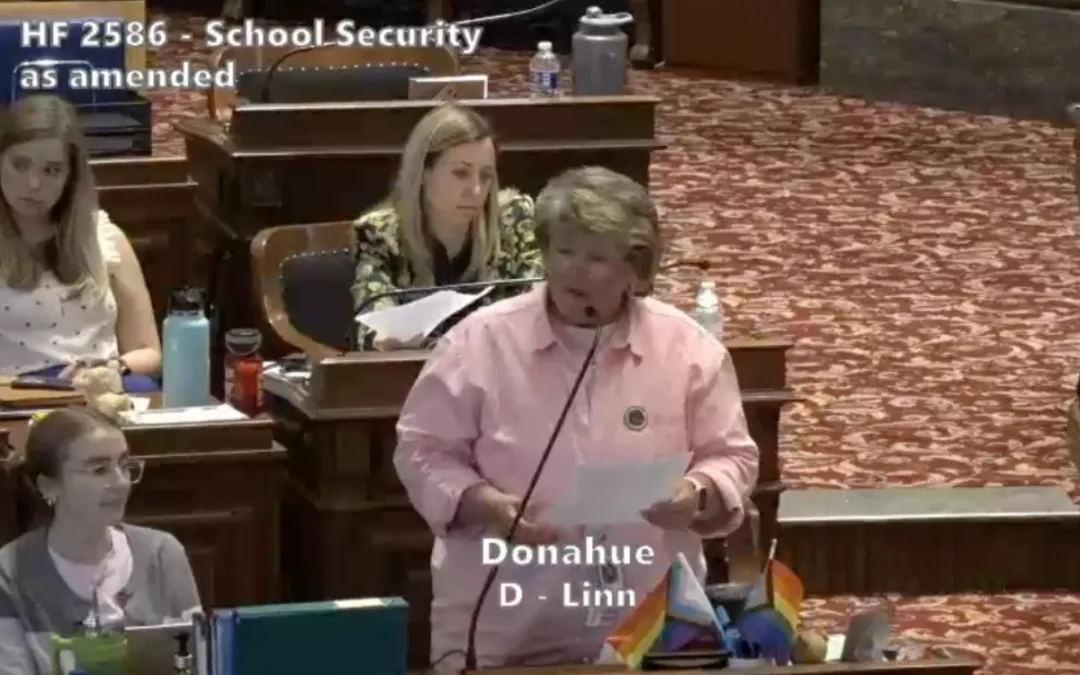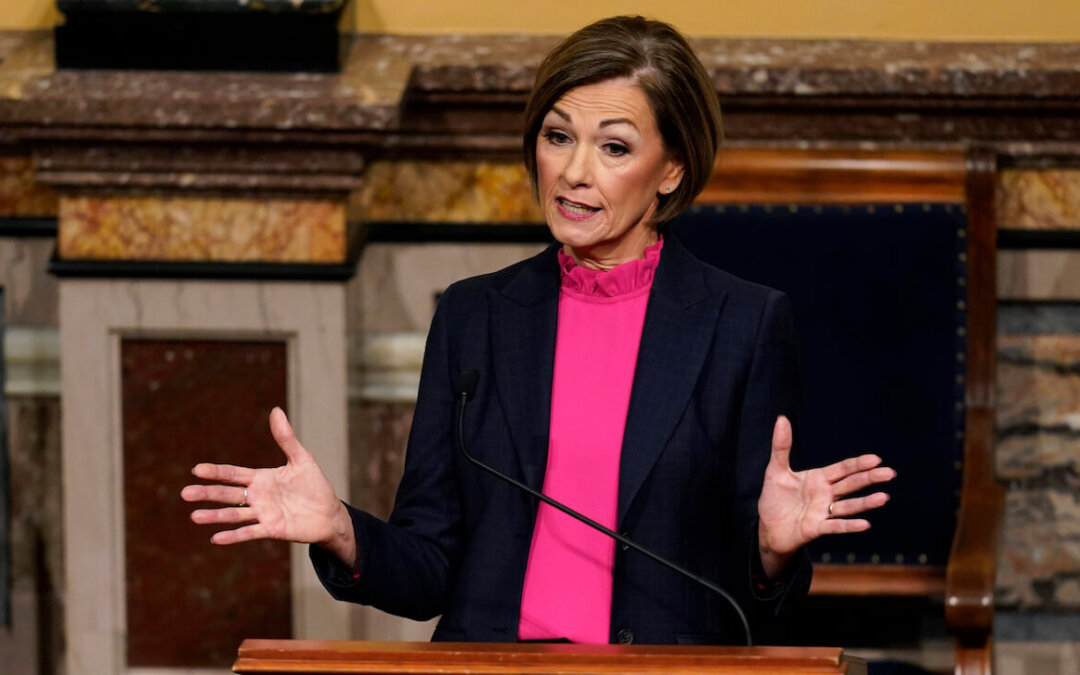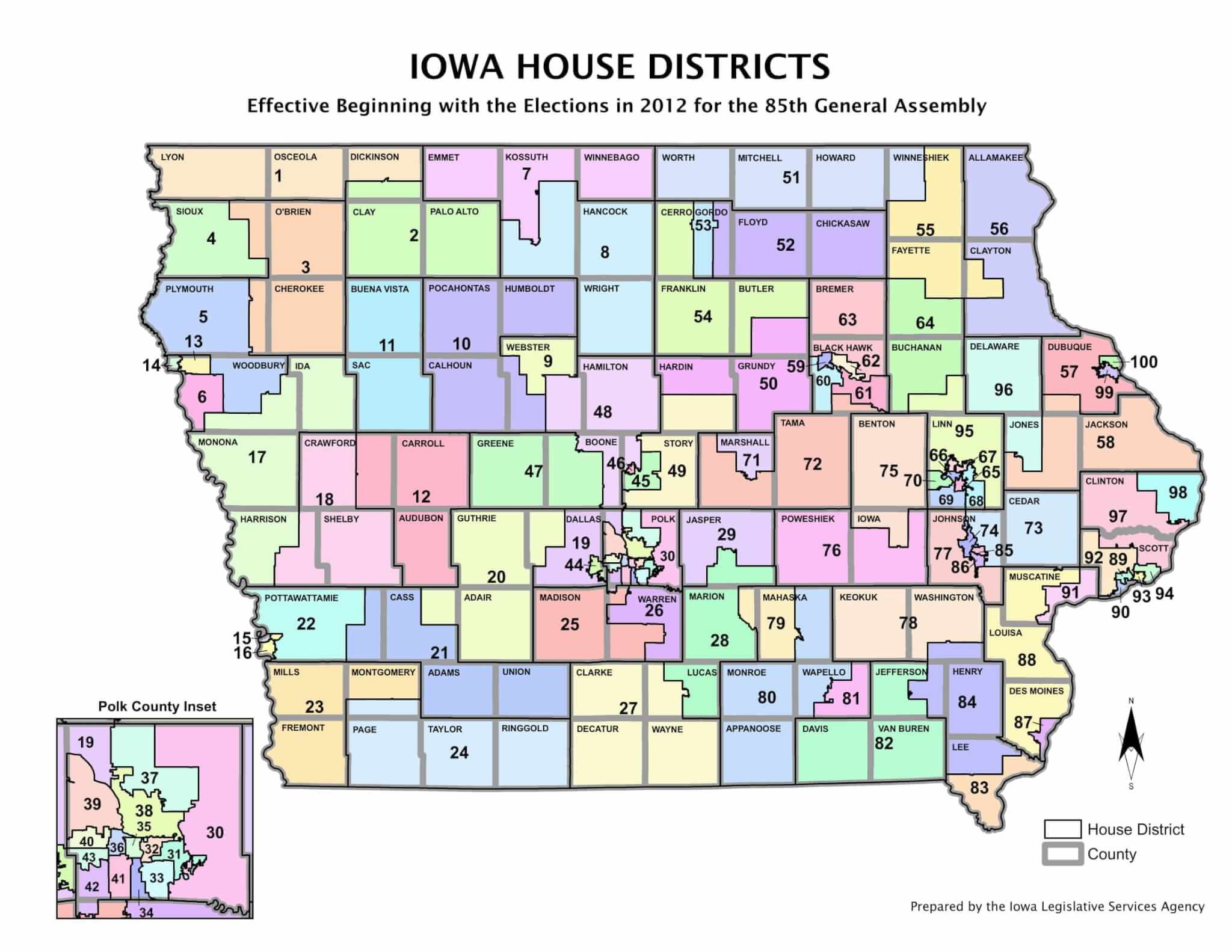
While only a small handful of Iowa Senate races seem like pure toss-ups at this point, there’s nearly a dozen Iowa House campaigns that could easily go either way. An unusually large number of incumbent Republican retirements, suburban swing districts possibly trending Democratic and voters everywhere frustrated with their top-of-ticket options has created a lot of uncertainty.
Republicans outnumber Democrats 57 to 43 in the Iowa House. Capturing eight seats to retake the majority would typically be a tall order, but thanks to strong recruiting and open seats, Democrats are optimistic about their chances. They’re practically certain to pick up at least one seat, and they face few real challenges to their current incumbents.
Unlike the Iowa Senate post, where it was easier to categorize the races into three levels of competitiveness, I’m going to list the House races into categories of “toss-up,” “lean/likely Republican” and “lean/likely Democrat.”
After conversations with insiders and activists, along with analyzing the current data, I’m relatively confident of where I’m putting these races, though slightly less so than the senate ones.
However, a very important caveat as always: This is where I see these races standing right now. Any candidate on this list could easily move up or down the list for various reasons between now and Election Day. A likely Democrat seat could go Republican in a Trump landslide, just as a likely Republican district may fall with a Clinton blowout. Plus, many of the mailers and TV ads are just getting going in these districts, and there’s a lot of work yet to be done with absentee ballots. More races could get added on to the list. Basically, don’t freak out if a race you like isn’t exactly where you’d prefer to see it. There’s still plenty of time.
All cash-on-hand numbers are from the latest mid-July report. All absentee request numbers are from September 23.
Toss-Up
House District 38 – GOP-Held
Representative Kevin Koester (R) vs Heather Matson (D) vs Jeffrey Meyers (Libertarian) vs Brett Nelson (Independent)
Location: Ankeny, Saylorville, rural Polk (map)
Registration:
Democrat: 6,657
Republican: 7,192
No Party: 6,448
Result 12: Koester (R) 52%, Phoenix (D) 43%
Obama 12: 49.3%
Braley 14: 42.3%
COH:
Koester: $13,856
Matson: $54,436
Early Vote Requests:
Democrat: 972
Republican: 290
No Party: 282
The Matchup:
Democrats have been bullish on this race for a very long time, ever since Heather Matson declared her run early last year. Ankeny, Iowa’s fastest-growing suburb, could be ground zero for this year’s shifting voter loyalties with Trump on the ticket, and Matson could easily benefit from suburban women frustrated with the Republican Party. Her profile of a young family fits the district well, and it’s an area where all the new influx of population weakens an incumbent’s advantage – many of the people moving in to the area don’t have a long relationship with Kevin Koester.
Matson has proven to be a prolific fundraiser and has raised more money for her first race than most incumbents – Democrat or Republican – have this year. Koester’s fundraising numbers and reported lack of visibility in the district don’t help. Several other Republicans who worked in education fields decided to retire shortly after Governor Branstad’s veto of the one-time school funding in 2015, but Koester remained. He was also a surprising early out in the nominating convention for the state senate seat that Jack Whitver ended up winning, and hasn’t been as close with the many establishment-type GOP leaders who live in Ankney.
All that being said, it’s still a challenging district for Democrats that is no sure thing, even with the amount of attention Matson’s candidacy has received. There’s other pick-up opportunities around the state that favor Democrats more, but Matson has put together a strong enough campaign that she can fight this out without the full air cover of the state party. The extra candidates in the race could make things interesting – Nelson got 686 votes in 2012 and a libertarian candidate might eat into Republicans’ margins, though it’s been difficult to predict third parties’ impacts all year.
House District 43 – GOP-Held
Representative Chris Hagenow (R) vs Jennifer Konfrst (D)
Location: Windsor Heights, West Des Moines, Urbandale (map)
Registration:
Democrat: 7,282
Republican: 7,439
No Party: 5,405
Result 12: Hagenow (R) 50.1%, Judkins (D) 49.9%
Obama 12: 50.6%
Braley 14: 47.4%
COH:
Hagenow: $222,913
Konfrst: $40,877
Early Vote Requests:
Democrat: 1,392
Republican: 318
No Party: 355
The Matchup:
This is the first of the three 2012 heartbreakers for Democrats that they hope to revenge this year with a full focus on these races. Susan Judkins came only 22 votes short of knocking off Hagenow in 2012. This district had a very small difference between Obama’s numbers and Braley’s, meaning Democrats have a high floor here and good turnout. Drake professor Konfrst just needs to boost it a little bit and get what swing voters she can to knock off the Republicans’ Majority Leader. She’s the House Democrats’ top door-knocker, so she’s doing what she needs to, and it’s a fully-urban district with pockets of sporadic-voting Democrats you can activate. The Konfrst team has built up one of the largest Democratic early vote totals in the state.
This will be Hagenow’s first reelection race as the Majority Leader. His massive fundraising advantage means he can saturate the mailboxes and TV stations with advertising. Though his views and votes are often to the right of this more-moderate district, Hagenow’s first TV ad focuses solely on support for public education. This will likely be the most expensive house race in the state.
But what gets spent here won’t go to other vulnerable districts. In fact, House Republicans have a money issue to deal with – two of their best fundraisers, Kraig Paulsen and Tom Sands, are retiring. An interesting thing to watch here is whether Hagenow is pressured to send some of his money to other races, as is typical of leadership.
The key to the win in this district is simple – Hagenow needs to pile up votes in the western Republican Clive; Konfrst needs to drive Democratic turnout in Windsor Heights and the eastern portions of West Des Moines and Clive.
House District 55 – GOP-Open
Michael Bergan (R) vs Pat Ritter (D)
Location: Decorah, West Union, Elkader (map)
Registration:
Democrat: 5,733
Republican: 6,585
No Party: 6,412
Result 12: Thomas (D) 51%, Klimesh (R) 49%
Obama 12: 55.2%
Braley 14: 45.6%
COH:
Bergan: $3,395
Ritter: $3,799
Early Vote Requests:
Democrat: 648
Republican: 170
No Party: 301
The Matchup:
Darrell Branhagen only served one term before retiring, so this Northeast Iowa seat becomes one of the top legislative battlegrounds in the state. The party registration numbers don’t tell the whole story, as this district has gone solidly Democratic in presidential years, though it’s a part of the state where split-ticket voting is big.
Ritter impressed in his primary, defeating a more liberal candidate from Decorah, the base of Democratic support in the district. That’s not easy to do at all, and points to Ritter’s ability to run a strong campaign in this rural district. Being from West Union could give him an advantage in the general since progressive Decorah Democrats will likely stick with the party line and he’ll over-perform in his home county of Fayette. He’s also more middle-of-the-road ideologically, and has a good appeal as a former Marine and small-town lawyer. A former Grinnell College student, he’s one of Chris Hall’s recruits.
Bergan, however, is a former Winneshiek County supervisor, so he’s won countywide in the district’s largest population center. Bergan is also one of those politicians who is related to what seems like half the county. One of Bergan’s children is even married to one of Jan Heikes’, the Democratic candidate for the state senate seat here.
Both candidates had primaries to get through and are rebuilding their campaign bank accounts. Democrats need to keep their eyes on the absentee numbers in this part of the state – a low early vote in 2012 hurt John Beard’s senate race.
House District 58 – GOP-Open
Andy McKean (R) vs Jessica Kean (D)
Location: Maquoketa, rural Jones County (map)
Registration:
Democrat: 7,023
Republican: 5,251
No Party: 8,662
Result 12: Moore (R) 51%, Schueller (R) 49%
Obama 12: 55.6%
Braley 14: 43.1%
COH:
McKean: $4,594
Kean: not filed yet
Early Vote Requests:
Democrat: 953
Republican: 210
No Party: 418
The Matchup:
Welcome to the most confusing ballot line in the state, where voters will decide if they like a “Mc” in front of their “Kean” or not. This is actually a very interesting race for Brian Moore’s seat, the most-Democratic seat held by a Republican. The two candidates come from very different backgrounds: Andy McKean is a 67-year-old former state senator with deep local connections, while Jessica Kean is a 31-year-old who works for a nonprofit that helps children with cancer.
McKean just barely lives in the district, right outside of Anamosa – he’s best known in Jones County, though he’s represented parts of Jackson County before. Most of the district’s population is in Jackson County, and Kean is in Maquoketa, right in the center of it. McKean is a great recruit for Republicans and probably their best hope of holding onto this district that really never should have been theirs’ in the first place. But Democrats are all-in with Kean, who has put together a good campaign in little time – she replaced Democrats’ original candidate Pete Hird, who withdrew for personal reasons, in late July. And the very strong Democratic registration advantage makes this one of their best pick-up opportunities.
Given the sharp 12-point drop-off from Obama to Braley, driving Democratic turnout in this district will be crucial. Kean has Abby Finkenauer and a volunteer group that comes down from Dubuque to help her with that.
House District 68 – GOP-Held
Representative Ken Rizer (R) vs Molly Donahue (D)
Location: Marion (map)
Registration:
Democrat: 6,577
Republican: 6,042
No Party: 7,266
Result 12: Lundby (D) 50.3%, Wagner (R) 49.7%
Obama 12: 54.5%
Braley 14: 47.7%
COH:
Rizer: $38,133
Donahue: $5,962
Early Vote Requests:
Democrat: 1,332
Republican: 341
No Party: 613
The Matchup:
Molly Donahue won a competitive primary to take on Ken Rizer for this swingy, Marion-based suburban district. A special education teacher, she’s part of one of Democrats’ “Fab Five” slates of candidates, where five women are on the ballot from top down. Donahue has gotten significant help for her race, including a visit from the National Education Association president, who helped knock some doors for the fellow educator. ISEA will invest a lot in this race. The Democratic early vote lead here is one of the best in the state.
Rizer worked the district extremely hard in 2014 when he defeated Dan Lundby. He’s a solid fundraiser, but many Linn County locals say they haven’t seen Rizer in the community much the past few months. In any other circumstance, Rizer would be in a strong position despite the Democratic registration advantage – a former Air Force commander and fighter pilot is a great profile for any district. But given Trump’s weakness in the suburbs, a very strong Democratic ground game with Liz Mathis’ help and his supposed absence, this district is a real toss-up.
House District 72 – GOP-Held
Representative Dean Fisher (R) vs Nathan Wrage (D)
Location: Tama County, rural Marshall County (map)
Registration:
Democrat: 5,272
Republican: 6,506
No Party: 7,905
Result 12: Fisher (R) 50.7%, Wrage (D) 49.3%
Obama 12: 50.9%
Braley 14: 40.7%
COH:
Fisher: $10,015
Wrage: $12,742
Early Vote Requests:
Democrat: 547
Republican: 153
No Party: 274
The Matchup:
The second of the 2012 heartbreakers. Wrage very nearly knocked off Fisher in a surprise in 2012, without the help of the state party. The thinking is now that the Democrats are fully committed to the race, Wrage can win this time. The rural, low-income district feels like the sort of place Trump could do well in, though the Meskwaki Settlement will likely turn out in large numbers against the GOP presidential nominee. The low Democratic early vote requests here should be concerning to Wrage, especially given the demographics and economic look of Democrats here.
Some local issues come in to play in this district, with the state’s closing of the juvenile home in Tama, which Fisher broke with his party to oppose. Fisher also does a good job with the local press in his district by making a show of donating his unused legislative expenses to local fire departments and other groups. But he also did some self-inflicted damage this past session when he was recorded on video telling a parent of a son who suffers from epileptic seizures that she should move to Colorado to get the medical marijuana they were advocating for.
House District 88 – GOP-Open
David Kerr (R) vs Ryan Drew (D)
Location: Muscatine, Louisa, Des Moines counties, outside of Muscatine and Burlington (map)
Registration:
Democrat: 5,598
Republican: 6,394
No Party: 6,871
Result 12: Sands (R) 54%, Sedlacek (D) 46%
Obama 12: 50.9%
Braley 14: 38.0%
COH:
Kerr: $4,092
Drew: $13,840
Early Vote Requests:
Democrat: 645
Republican: 195
No Party: 271
The Matchup:
The house races in the Des Moines suburbs have gotten an awful lot of attention, but it might be these next three districts in Eastern/Southeastern Iowa that actually determine the majority in the Iowa House. Democrats didn’t even have a candidate for this race until incumbent Tom Sands retired two days after the June primary. The candidate it seemed Sands had chosen as his successor didn’t win at the nominating convention, which is always a little concerning. Instead Republicans nominated Kerr, an older farmer from Louisa County. Kerr ran against Senator Tom Courtney in 2008 and only got 40% then, but that was a district with the heavily-Democratic Burlington.
Democrats have a star recruit here in Ryan Drew, an operating engineer and president of the Southeast Iowa Building Trades. Labor has talked him up as a rising leader for years. He also has strong ties to local business in the area as well thanks to his work in negotiating some of the biggest work contracts in Southeast Iowa with the fertilizer plant and the pipeline. Drew has essentially been responsible for getting a lot of people in his district good-paying jobs, while still maintaining good relationships with business leaders.
The other thing to watch here is the Hispanic communities of West Liberty and Columbus Junction. Democrats have focused a lot of organizing efforts to get the residents of these two towns more engaged in the political process, and Trump’s presence this year may activate them in a big new way. Drew could use some more labor door-knockers to boost the Democratic absentee requests.
House District 91 – GOP-Held
Representative Gary Carlson (R) vs Phil Weise (D)
Location: Muscatine (map)
Registration:
Democrat: 5,840
Republican: 5,945
No Party: 6,870
Result 12: Lofgren (R) 53%, Dabeet (D) 47%
Obama 12: 57.6%
Braley 14: 44.1%
COH:
Carlson: $29,721
Weise: $875
Early Vote Requests:
Democrat: 993
Republican: 219
No Party: 489
The Matchup:
Carlson easily fended off the underperforming John Dabeet in the last two cycles in this Democratic-leaning district, but faces a much more serious challenge this year from Weise. This district will likely be better for Trump, even with the Hispanic population here, but it’s a question of just how much better. Obama got 57.6% last time – even if Clinton does poorly, she’d have to do really bad for Democrats to lose here.
Carlson is big in the chamber of commerce crowd in Muscatine, which essentially runs this working class town. He was a long-time executive at HNI, the large furniture manufacturer in town.
Weise has a compelling reason to run this year – he has a developmentally-challenged sister who has faced the brunt of Branstad’s Medicaid privatization. He’s working hard and this will be a good turnout area of the state for Democrats with Chris Brase’s senate campaign helping out. Weise does need to raise some more money, however.
House District 92 – GOP-Held
Representative Ross Paustian (R) vs Ken Krumweide (D)
Location: Rural Scott County, Eldridge, Northwest Davenport (map)
Registration:
Democrat: 5,936
Republican: 6,181
No Party: 8,321
Result 12: Wood (D) 52%, Paustian (R) 48%
Obama 12: 53.9%
Braley 14: 43.5%
COH:
Paustian: $11,958
Krumweide: $11,375
Early Vote Requests:
Democrat: 1,086
Republican: 250
No Party: 533
The Matchup:
Welcome to the ping-pong district, where Paustian wins on the midterm years and Democrats win on the presidential years. Will it be the same this time? The early vote numbers are looking good for Democrats, and Brase’s team is working with Krumweide’s here as well. The Quad City Times’ editorials on education funding have been brutal as of late, hurting Republicans like Paustian with the swing voters here.
The key to this district is the west side of Davenport, where several heavily-African American precincts are located. Turn those places out big and win Eldridge, and Democrats will pick up this seat.
House District 95 – GOP-Open
Louie Zumbach (R) vs Richard Whitehead (D)
Location: Rural Linn County, Mt. Vernon, Center Point (map)
Registration:
Democrat: 6,095
Republican: 6,224
No Party: 7,530
Result 12: Stanerson (R) 50.6%, Keast (D) 49.4%
Obama 12: 52.0%
Braley 14: 43.7%
COH:
Zumbach: $5,515
Whitehead: $14,179
Early Vote Requests:
Democrat: 742
Republican: 207
No Party: 390
The Matchup:
The third of the 2012 heartbreakers. Democrats mistakenly pulled out of this district too soon four years ago and Kristi Keast came up just short. Geography is important in this district, which is a disparate mix of rural Linn County towns and a few exurb neighborhoods. Mt. Vernon and Lisbon are the Democratic strongholds here, but their communities aren’t very well-connected to Center Point and Central City.
Democrats feel good about this race because Whitehead hails from Center Point, the more Republican side of the district, and was a superintendent for the schools that covers most of the northern part of the house district. Mt. Vernon will hold with Democrats regardless, so Whitehead should be able to win over swing voters that he personally knows on the other side. It will be important for Whitehead to run a strong turnout operation on his own, however, as it appears the party isn’t targeting the state senate race here like they did for most of 2012.
Zumbach is from the already-Republican part of the district in rural Coggan. This is also the interesting district where second-cousin Dan Zumbach is running for reelection to the state senate. It’s unclear how voters will deal with two Zumbachs, one right after the other on the ballot.
Lean Democrat
House District 15 – Dem-Held
Representative Charlie McConkey (D) vs Bill Riley (R)
Location: West side of Council Bluffs, Carter Lake (map)
Registration:
Democrat: 5,381
Republican: 4,291
No Party: 5,854
Result 12: Brandenberg (R) 52%, Yaple (D) 48%
Obama 12: 57.1%
Braley 14: 46.2%
COH:
McConkey: $18,149
Riley: hasn’t filed
Early Vote Requests:
Democrat: 1,132
Republican: 261
No Party: 464
The Matchup:
This is probably Republicans’ only real shot of picking up a Democratic-held seat in 2016. That’s mostly due to the demographics of the district – the white, low-income west end of Council Bluffs was good to Trump in the Iowa Caucus, and may shift his way in the general, away from its traditional Democratic roots. But like the Muscatine district, just how bad could it be for Democrats to seriously eat into their presidential margin from last time here? And McConkey looks like the district – a regular, working-class guy. The Mike Gronstal race will have an impact here too, as the party will work hard at running up the early vote margin.
House District 51 – GOP-Open
Jane Bloomingdale (R) vs Tim Hejhal (D)
Location: Worth, Mitchell, Howard counties (map)
Registration:
Democrat: 5,146
Republican: 6,423
No Party: 8,528
Result 12: Byrnes (R) 65%, Hungerford (D) 35%
Obama 12: 55.2%
Braley 14: 47.7%
COH:
Bloomingdale: $4,680
Hejhal: $6,378
Early Vote Requests:
Democrat: 670
Republican: 212
No Party: 375
The Matchup:
If all else fails for Democrats in 2016, they should at least pick up this Northern Iowa district. Josh Byrnes, the last of the moderate Republicans, kept this seat frustratingly out of Democrats’ reach for years. Although Republican registrations outnumber the Democrats, the No Party voters up here lean Democratic. This is also the home of the Tri-County Democrats, the party’s best rural operation that has made several of these counties the most Democratic heavily-white counties in the entire country.
Adding to Democrats’ luck here is that Hejhal is a great recruit with a perfect bio – a retired Lt. Colonel in the Iowa Air National Guard and the high school principal in Osage, the most Republican part of the district. One of Democrats’ first field offices of 2016 was placed in Osage to ensure his and Mary Jo Wilhelm’s success.
Jane Bloomingdale is still a solid candidate for the Republicans, who served as mayor and councilwoman for Northwood. But this is one of the few areas of the state trending Democratic and Hejhal is very well-positioned for a victory.
Likely Democrat
House District 26 – Dem-Held
Representative Scott Ourth (D) vs Rebel Snodgrass (R)
Location: Indianola, Warren County (map)
Registration:
Democrat: 6,511
Republican: 7,190
No Party: 6,807
Result 12: Ourth (D) 52%, McCoy (R) 48%
Obama 12: 50.2%
Braley 14: 42.1%
COH:
Ourth: $22,202
Snodgrass: $1,761
Early Vote Requests:
Democrat: ?
Republican: ?
No Party: ?
The Matchup:
Despite the Republican lean to this Warren County district, where the Tea Party took hold after 2010, Ourth is a strong incumbent who works hard, raises the money he needs and isn’t going to take his eye off his race.
Snodgrass is an interesting fellow (not least of all for his full name) and has been getting plenty of visibility for his campaign, especially in local parades. But there’s a fine line between colorful and just being weird, and Snodgrass might fall on the wrong side of that line for too many voters. Even in a year of an outsized personality at the top of the ticket, expect Ourth to retain this seat.
The Secretary of State’s office doesn’t have the absentees listed for this district – Warren County might be one of those who haven’t entered their data yet. I’ll update once that’s available.
House District 40 – Dem-Held
Representative John Forbes (D) vs Scott Reed (R)
Location: Urbandale (map)
Registration:
Democrat: 6,851
Republican: 7,730
No Party: 5,723
Result 12: Forbes (D) 53%, Brown (R) 47%
Obama 12: 49.3%
Braley 14: 45.4%
COH:
Forbes: $15,344
Reed: $1,857
Early Vote Requests:
Democrat: 1,122
Republican: 418
No Party: 284
The Matchup:
Republicans would love to regain this suburban Des Moines seat that Democrats nabbed in 2012. But Forbes is an extremely well-liked local pharmacist with deep ties to the community. As long as he’s running, it’ll be difficult for the GOP to beat him. Reed hasn’t impressed many after a very low-turnout primary win and lackluster fundraising. Given Republicans’ potential struggles in the suburbs, it’s hard to see how Forbes could possibly lose this year. It does, however, appear that Republicans have done some sort of absentee effort in this area. This is one of their best early vote districts.
House District 56 – Dem-Held
Representative Patti Ruff (D) vs Kristi Hager (R)
Location: Allamakee, Clayton counties (map)
Registration:
Democrat: 5,008
Republican: 7,232
No Party: 6,989
Result 12: Ruff (D) 51%, Hager (R) 49%
Obama 12: 52.0%
Braley 14: 41.0%
COH:
Ruff: $12,583
Hager: $722
Early Vote Requests:
Democrat: 541
Republican: 206
No Party: 321
The Matchup:
If at first you don’t succeed, try getting your wife to run instead. Kristi Hager’s husband, Bob Hager, was defeated by Ruff in 2012 when Ruff beat him after his first term in office. Hager makes an interesting candidate – a nurse and former operator of a faith-based re-entry home for former prisoners and the homeless.
But Ruff is another Democratic candidate who fits the district so well, an outdoors enthusiast and grain elevator operator on the Mississippi River. The registration numbers look bad here for Democrats, but the reality is different, with Northeast Iowa’s swingy reputation coming into play. There’s too many seats for Republicans to defend this year that even if Hager was a good candidate who had raised more money, they’d be hard-pressed to spend many resources here.
Like the neighboring Ritter/Bergan district, Democrats need to watch the early vote numbers here. They need to seriously boost what they have right now.
House District 64 – Dem-Held
Representative Bruce Bearinger vs Zach Schultz (R)
Location: Independence, Oelwein (map)
Registration:
Democrat: 5,432
Republican: 4,686
No Party: 8,116
Result 12: Bearinger (D) 66%, Gavant (R) 35%
Obama 12: 57.8%
Braley 14: 46.7%
COH:
Bearinger: $16,307
Schultz: hasn’t filed
Early Vote Requests:
Democrat: 852
Republican: 153
No Party: 448
The Matchup:
Bearinger fended off Craig Johnson (now running against Schoenjahn) in a close race in 2014, and should prevail in his reelection efforts in this Democratic-leaning district. Schultz is a 21-year-old former campaign staffer who was chosen late through a special nominating convention in July. Democrats are confident about winning this race.
House District 57 – Dem-Open
Tom Stecher (D) vs Shannon Lundgren (R)
Location: Dyersville, rural Dubuque County (map)
Registration:
Democrat: 7,874
Republican: 6,325
No Party: 8,095
Result 12: Dunkel was unopposed in 2012
Obama 12: 49.0%
Braley 14: 42.7%
COH:
Stecher: $11,134
Lundgren: $411
Early Vote Requests:
Democrat: 1,228
Republican: 331
No Party: 439
The Matchup:
Nancy Dunkel’s retirement could have opened up a decent opportunity for Republicans in this potentially-winnable seat. Tom Stecher, however, looks to be in a very good position here and Lundgren looks to be one of Republicans’ weaker recruits this year. Lundgren is a biker bar operator who was an early Trump supporter. Trump hasn’t been doing well with Catholics, so that might not play well in this heavily-Catholic district. Only having $411 on hand isn’t very encouraging either.
Democrats clearly still wanted to make absolutely sure they held this seat, as the big Democratic early vote advantage seems to indicate.
Lean Republican
House District 42 – GOP-Held
Representative Peter Cownie (R) vs Claire Celsi (D)
Location: West Des Moines (map)
Registration:
Democrat: 7,009
Republican: 7,347
No Party: 5,845
Result 12: Cownie (R) 57%, McRae (D) 43%
Obama 12: 49.9%
Braley 14: 45.5%
COH:
Cownie: $115,065
Celsi: $30,870
Early Vote Requests:
Democrat: 959
Republican: 263
No Party: 221
The Matchup:
If Trump struggles down the stretch and really does implode in the suburbs, Democrats should sweep all three of the Hagenow/Konfrst, Koester/Matson and Cownie/Celsi races. But if the national trends stay close, this seems like the toughest of the three main Des Moines suburbs races. The Cownie name goes far in Polk County, though the Celsi’s have a long history here too.
Cownie has had an easy go of reelection races for some time, easily dispatching weak candidates in the past, some of which dropped out of the race partway through (his 2012 opponent was just sentenced in a bizarre anthrax hoax). He’s also one of the House Republicans’ best fundraisers and – like Hagenow – will have more than plenty to spend to defend himself. He pulls in some votes from the wealthier Democrats in the district who knew his father.
Celsi is putting everything she’s got into the race and is working the doors hard, the stories from which she shares every day on Facebook, to the delight of Iowa’s Democratic activists. She’s put together enough funding on her own that she should be able to run a strong mail program, even if she doesn’t get up on TV. Making sure the Democrats in Valley Junction neighborhood (which went for Sanders in the caucus) turns out well will be key here.
Likely Republican
House District 30 – GOP-Held
Representative Zach Nunn (R) vs Joe Riding (D)
Location: Altoona, rural Polk (map)
Registration:
Democrat: 6,846
Republican: 7,823
No Party: 7,070
Result 12: Riding (D) 52%, Carley (R) 48%
Obama 12: 47.7%
Braley 14: 40.0%
COH:
Nunn: $40,233
Riding: $5,649
Early Vote Requests:
Democrat: 704
Republican: 224
No Party: 193
The Matchup:
Democrats would have liked to end Nunn’s promising career early on by defeating him after his first term in this suburban Polk County district. But it looks doubtful this year with grumbling about Riding’s time commitment to the race. Nunn got called up for active duty for 90 days during this summer with the Air Force, which took him off the campaign trail, but also got him lots of positive press. There’s still a chance for Riding if Clinton mops up in the suburbs after a Trump collapse.
House District 60 – GOP-Held
Representative Walt Rogers (R) vs Gary Kroeger (D)
Location: Cedar Falls, Waterloo (map)
Registration:
Democrat: 6,295
Republican: 7,291
No Party: 7,391
Result 12: Rogers (R) 52%, Greenwood (D) 48%
Obama 12: 50.2%
Braley 14: 44.0%
COH:
Rogers: $13,894
Kroeger: $16,724
Early Vote Requests:
Democrat: 1,307
Republican: 348
No Party: 506
The Matchup:
Kroeger made the smart and responsible move (something many candidates don’t do) in dropping down from his congressional race to this local statehouse one. He still faces an uphill climb against Rogers, but has a real shot in this year of the outsider. A former SNL actor, Kroeger is an interesting candidate who attracted a lot of attention during his previous run and comes off as much more authentic than many long-time politicians. This is also one of the best districts in the state for Democratic absentee ballots, thanks in part to Jeff Danielson’s race.
If Kroeger gets out on the doors enough and spreads that charisma with the voters face-to-face, he’ll have a real chance at the upset here. But Rogers is a very strong incumbent who has fended off tough challenges before. Rogers is one of Republicans’ best door-knockers, often making several passes through his district. He has a following from his church and has a strong local network.
House District 63 – GOP-Held
Representative Sandy Salmon (R) vs Teresa Meyer (D)
Location: Waverly, rural Black Hawk (map)
Registration:
Democrat: 4,977
Republican: 6,645
No Party: 8,817
Result 12: Salmon (R) 50.3%, Heckroth (D) 49.7%
Obama 12: 50.0%
Braley 14: 41.0%
COH:
Salmon: $29,717
Meyer: $8,734
Early Vote Requests:
Democrat: 772
Republican: 220
No Party: 333
The Matchup:
If former State Senator Bill Heckroth couldn’t win this in 2012, it’ll be a tough time for Democrats in 2016. This is the Republican portion of Brian Schoenjahn’s senate district, and seems like an area of the state that might trend even more to the GOP this year. Democrats’ might have a shot if they get a big boost from the students at Waverly.
House District 67 – GOP-Open
Ashley Hinson (R) vs Mark Seidl (D)
Location: Marion, Hiawatha (map)
Registration:
Democrat: 5,907
Republican: 6,995
No Party: 7,211
Result 12: Paulsen (R) 53%, Seidl (D) 47%
Obama 12: 49.2%
Braley 14: 43.7%
COH:
Hinson: $30,189
Seidl: $15,425
Early Vote Requests:
Democrat: 1,258
Republican: 305
No Party: 497
The Matchup:
Taking a page out of the Democrats’ playbook with Liz Mathis, Republicans recruited their own local TV reporter and host with KCRG’s Ashley Hinson. She’s become one of Republicans’ hardest workers, often teaming up with senate candidate Rene Gadhela. Though Democrats had real hopes of capturing this seat after Paulsen announced his retirement, this is seen as the much tougher of the two house seats under Mathis.
With no help in 2012, Seidl came just six points within defeating Paulsen. Paulson didn’t spend any money locally that year since he was Speaker, though, so it wasn’t a completely fair fight. Seidl will be helped by the strong turnout operation for Mathis, which has clearly boosted Democrats’ early vote numbers here.
Make it all the way to the end again? Congratulations! Now go out and impress your friends at the bar by casually dropping names like Tim Hejhal and Louie Zumbach into conversations.
by Pat Rynard
Posted 9/25/16
Politics
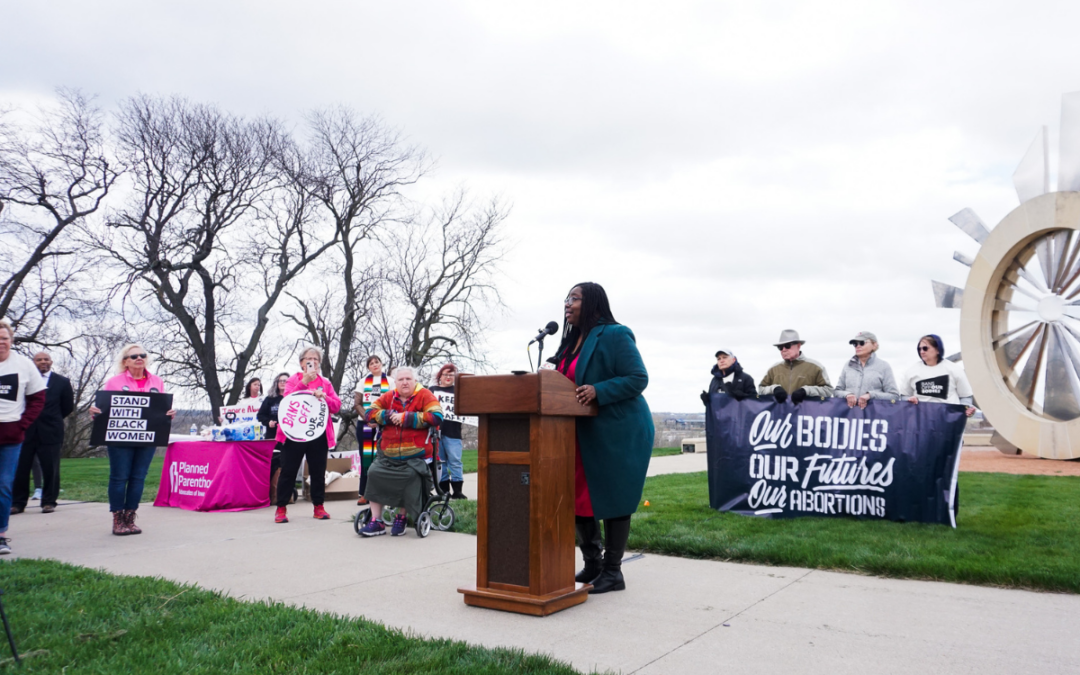
Abortion supporters rally before Iowa Supreme Court arguments
Abortion saved her life seven years ago and Leah Vanden Bosch is more grateful for it now than ever. Vanden Bosch, who serves as the development and...
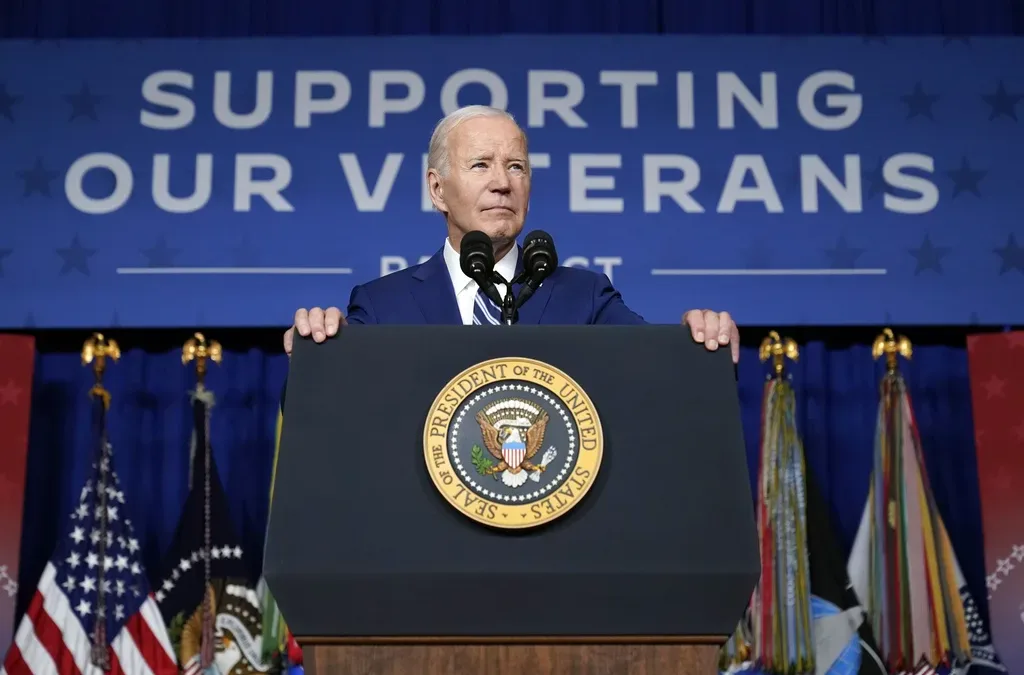
New VA program to help more than 40,000 veterans stay in their homes
The Department of Veterans Affairs (VA) will launch a “last resort” program for tens of thousands of American veterans who are in danger of losing...
Local News

No more Kum & Go? New owner Maverik of Utah retiring famous brand
Will Kum & Go have come and gone by next year? One new report claims that's the plan by the store's new owners. The Iowa-based convenience store...

Here’s a recap of the biggest headlines Iowa celebs made In 2023
For these famous Iowans, 2023 was a year of controversy, career highlights, and full-circle moments. Here’s how 2023 went for the following Iowans:...




